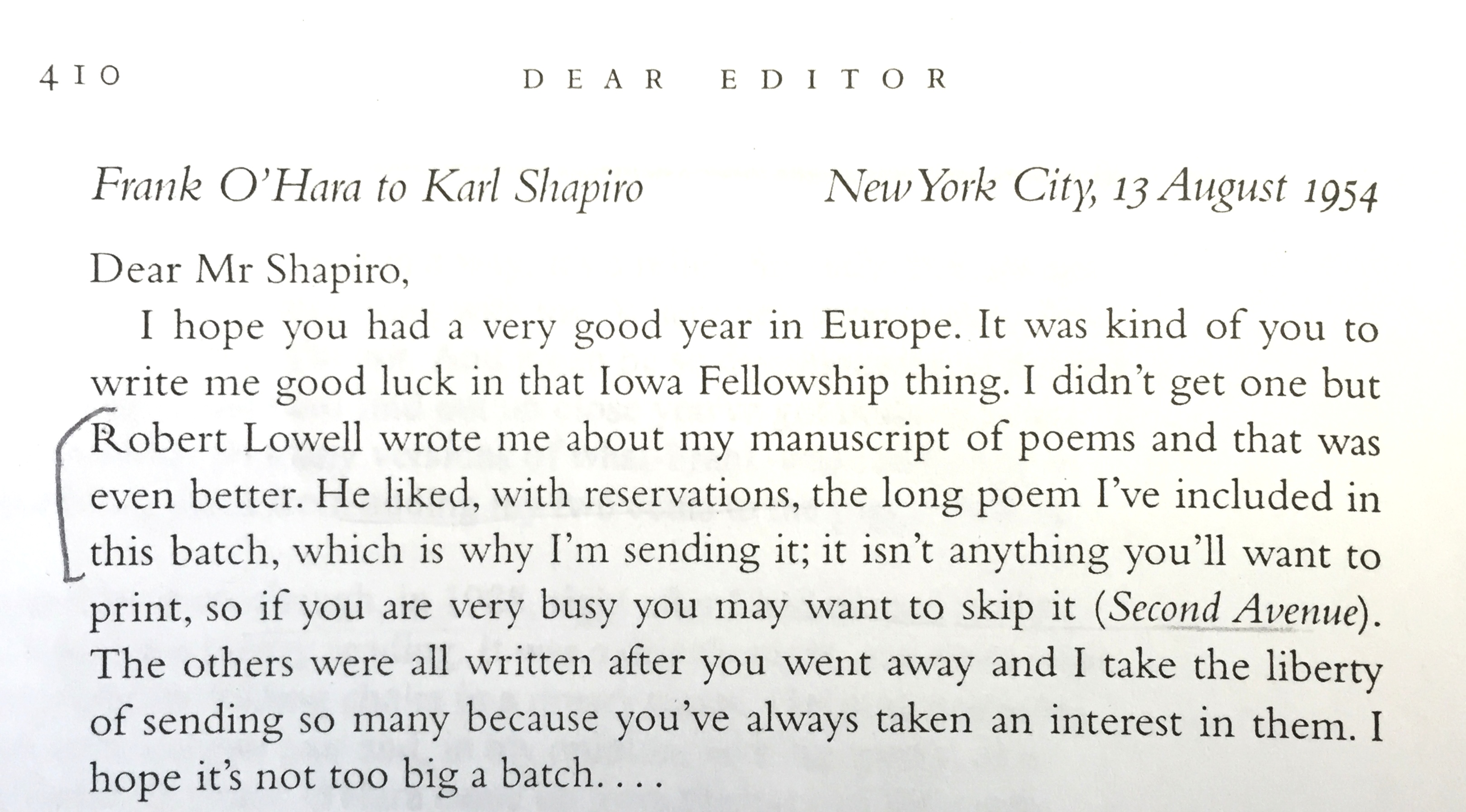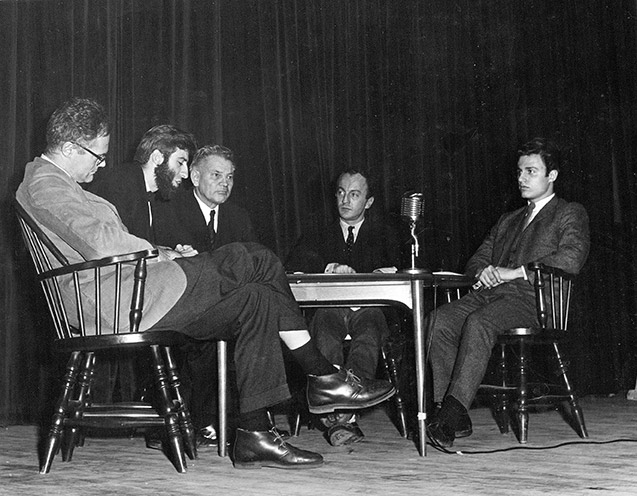
Today is the 100th birthday of Robert Lowell, which has sparked a little flurry of attention to Lowell and his legacy, as has a new book by Kay Redfield Jamison on Lowell’s struggles with bipolar illness and its relationship to his poetry, which is reviewed in today’s New York Times. Coincidentally, I happened to teach Frank O’Hara’s “Poem (Lana Turner has collapsed!” in my graduate seminar yesterday, which, naturally, entailed some discussion of the famous story surrounding O’Hara’s writing and delivery of that poem.
As I wrote in this earlier post on the poem, O’Hara composed it while he was on the way to give a reading with Robert Lowell at Wagner College on Staten Island. O’Hara didn’t care much for Lowell’s poetry, and as David Lehman tells it in The Last Avant-Garde, “O’Hara regarded the event as something of a grudge match; his close friend Bill Berkson remembers it as a ‘mano/mano’ duel. February 9, 1962, was a cold, snowy day in the city. On the way to the Staten Island Ferry, O’Hara bought the New York Post and on the choppy half-hour ride he wrote an instant meditation on the tabloid revelation that Hollywood actress Lana Turner had collapsed… O’Hara read the poem that afternoon, making it clear that he had written it in transit. The audience loved it; Lowell looked put out.” When it was his turn to read, a peeved Lowell told the crowd that he was very sorry, but he hadn’t written a poem on the way to the reading.
O’Hara’s distaste for Lowell’s work (and all it seemed to represent, as the epitome of the postwar poetry establishment) is well-known. In a 1965 interview, O’Hara offered a scathing assessment of Lowell’s famed “Skunk Hour” and the poet’s supposedly groundbreaking turn to the personal in Life Studies:
Lowell has . . . a confessional manner which (lets him) get away with things that are really just plain bad but you’re supposed to be interested because he’s supposed to be so upset. I don’t think that anyone has to get themselves to go and watch lovers in a parking lot necking in order to write a poem, and I don’t see why it’s admirable if they feel guilty about it. They should feel guilty. Why are they snooping? What’s so wonderful about a Peeping Tom? And then if you liken them to skunks putting their noses into garbage pails, you’ve just done something perfectly revolting. No matter what the metrics are. And the metrics aren’t all that unusual. Every other person in any university in the United States could put that thing into metrics.
What’s less well-known, however, is that O’Hara and Lowell weren’t always so dismissive of each other. In fact, one can see a rather surprising sign of this in a little-discussed 1954 letter O’Hara wrote to Karl Shapiro, who was at the time the editor of Poetry magazine. In sending along some work for Shapiro to consider, O’Hara mentions that Lowell, of all people, had recently praised some of his work:
It was kind of you to write me good luck in that Iowa Fellowship thing. I didn’t get one but Robert Lowell wrote me about my manuscript of poems which was even better. He liked, with reservations, the long poem I’ve included in this batch, which is why I’m sending it; it isn’t anything you’ll want to print, so if you are very busy you may want to skip it (Second Avenue).
The most striking thing about this passage is not that Lowell wrote O’Hara to compliment his poems, or that O’Hara would draw on Lowell’s cultural capital to sway Shapiro in his role as editor, but that Lowell particularly liked the long, wild Second Avenue, one of O’Hara’s most experimental, disjunctive, and surrealist poems. (In an unpublished letter from 1962, O’Hara also mentions that John Hollander was fond of Second Avenue, another head-scratcher). The poem begins in rather un-Lowell-like fashion:
Quips and players, seeming to vend astringency off-hours
celebrate diced excesses and sardonics, mixing pleasures,
as if proximity were staring at the margin of a plea …
Not surprisingly, Shapiro passed on the poem for Poetry, but the fact that a poet like Lowell (and Hollander) liked it, even with reservations, just goes to show, perhaps, that our rigid categories and definitions of American poetry — for example, everyone knows Robert Lowell and Frank O’Hara belong in enemy camps! — are not so simple when you look closely at the messy history of poetry itself.



RobertLowell was often sent to Maclean’s mental hospital. It was an Antioch co-op job and I visited a friend of mine who was working there and got to meet him. He was very manic and jittery. He came to Berkeley when I was a student and a sell out crowd turned out. But he read on and on and on and the crowd started to leave. Eventually a handful were left. I heard one disappointed student leave muttering “Who cares about this guy’s fucking family all that much”.
Pingback: In Which He Liked Frank O’Hara For The Same Reason He Had Not Liked Him Before – Kenneth Koch | 1960s: Days of Rage